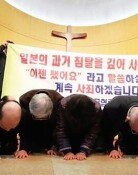[Opinion] Partner Poverty
Some people have an all-or-nothing attitude when it comes to human relationships. If they click with someone, they fall head over heels, but the moment they feel that the other person isnt as invested as they are, they burn all bridges. When this repeats itself, the person becomes a loner.
Professor of neuropsychiatry at Konkuk University, School of Medicine Ha Ji-hyun says, This happens because they want an unrealistically ideal relationship that just doesnt exist. Dont reach for the stars, look around you on earth. In other words, a practical expectation of relationships reduces disappointment.
Others try to define ever-so-fickle human relationships into boxes. They say that a stalker is somebody who cant admit that love changes. In the movie One Fine Spring Day, the main male character demands of his girlfriend, How can love change? But people change and love changes. When the faith people place in love is betrayed, they feel despondent and spend their springs (read: lives) realizing that love isnt forever.
The human race in the digital era is dubbed Neo-nomads. As they move around during their lives, the capacity for change in their relationships increases. Where theres a will, they change jobs and get new spouses. There are no eternal relationships. Continuity may have been the greatest value to those who preferred the static way of living, but to neo-nomads who are concerned with survival and prosperity in a rapidly changing world, human relationships are a thing to be managed in a businesslike way. To maximize efficiency with limited time and money, selection and centralization is key, not indiscriminate networking.
The same goes for international relations. Futurologist Alvin Toffler once said, Korea lost its real friends (partners) by treating allies like the United States, Japan, and China, with equidistance diplomacy. With an apparently teeming bunch of friends but not a single reliable partner, he called the situation, Partner Poverty. In actuality, might really does make right in the diplomacy arena, and push comes to shove, equidistance diplomacy becomes an abstract notion when surrounded by the big powers. A wishy-washy neutral stance is a virtue that belongs to the big powers, not to stuck-in-the-middle Korea. With Tofflers words in mind, we should pull our diplomacy down from the stars and back down to earth.
Huh Moon-myung, Editorial Writer, angelhuh@donga.com







